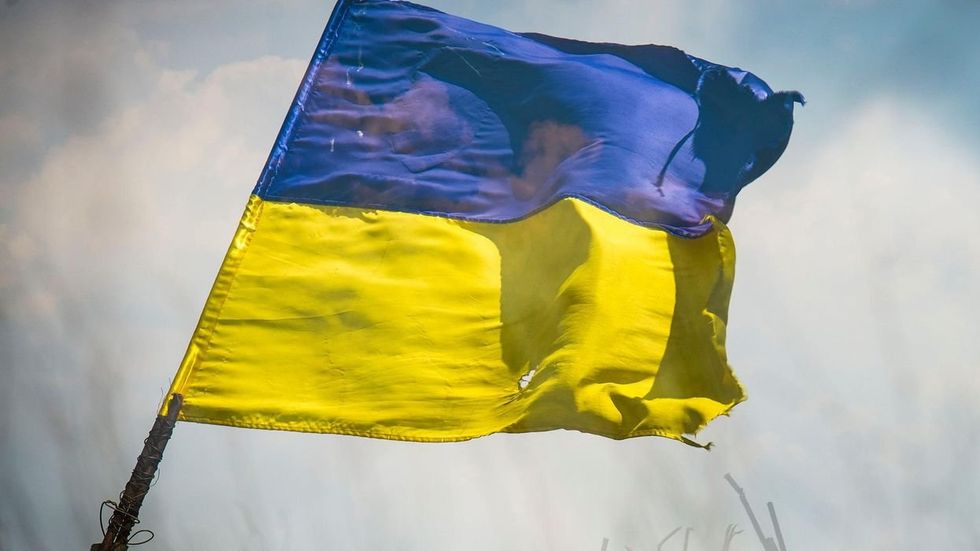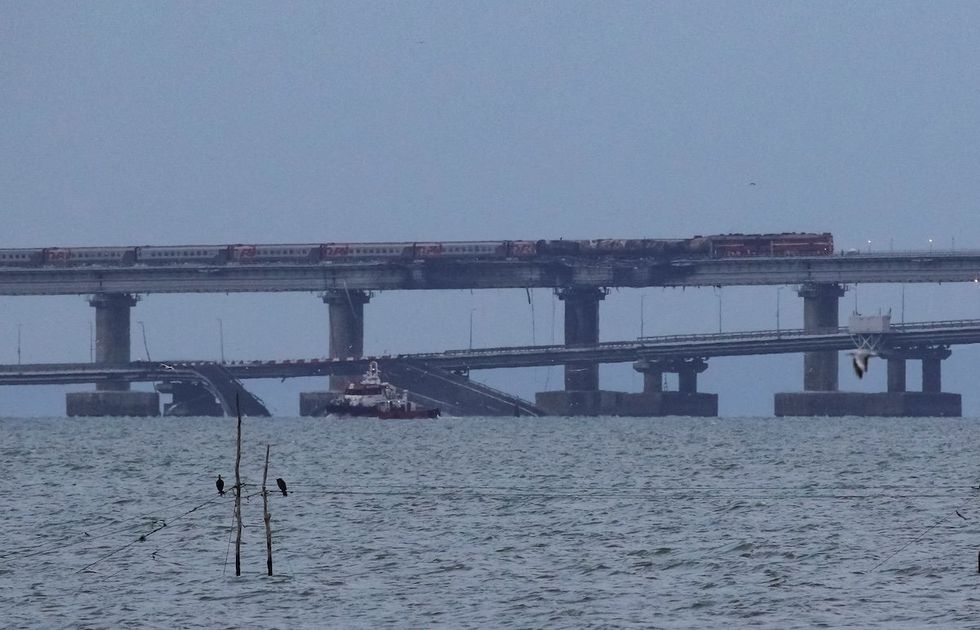Trending Now
We have updated our Privacy Policy and Terms of Use for Eurasia Group and its affiliates, including GZERO Media, to clarify the types of data we collect, how we collect it, how we use data and with whom we share data. By using our website you consent to our Terms and Conditions and Privacy Policy, including the transfer of your personal data to the United States from your country of residence, and our use of cookies described in our Cookie Policy.
{{ subpage.title }}
Climate change activists hang a sign on Tower Bridge during a demonstration against the climate crisis, in central London, Britain, April 8, 2022.
Climate change, Trump tariffs, India rice rules
2.2: As the world gets hotter from climate change, we are using more energy to cool ourselves down, which is making climate change worse. According to the IEA, record-high temps in 2024 were responsible for half of the rise in emissions from energy – as severe heat waves caused air conditioning usage to surge, fueling electricity demand, and in turn raising emissions. This contributed to a 2.2% increase in global energy demand, up from 1.8% the year before. As a result, greenhouse gas emissions from energy consumption grew by 0.8% over the past year.
25: Donald Trump on Monday announced a 25% tariff on all imports from countries that buy Venezuelan oil or gas, starting April 2, alongside new tariffs on Venezuela itself. Venezuela will face a “secondary” tariff because it is the home to the Tren de Aragua gang, which Trump said is sending members to the US.
40: India has lifted its restrictions on rice exports, a move that should help curb food price inflation and increase agricultural workers’ salaries amid an economic slowdown in the country. Initially imposed after Russia’s 2022 invasion of Ukraine to prevent domestic shortages, the curbs drove up prices worldwide. As the largest rice exporter – accounting for over 40% of global rice exports – India’s decision should benefit poorer nations, especially in Africa, where rising food costs have fueled unrest. However, it will come at a cost for other rice-producing countries like Thailand and Pakistan, which worry that India will flood the market and prices will plummet.
93: US egg imports from Brazil surged 93% in February as a part of the Trump administration’s $1 billion plan to lower egg prices, which includes upping imports, helping farmers prevent the spread of the virus, and researching vaccine options. The eggs will end up in processed foods, freeing up more fresh eggs for grocery shelves. The US Food and Drug Administration is also reviewing a petition from the National Chicken Council to allow for the sale of eggs laid by chickens raised for meat – something it has previously forbidden because of salmonella risks.
200,000: Speaking of eggs, the Trump administration is seeking corporate sponsors for the White House Easter Egg Roll, a departure from tradition. Sponsorship packages range from $75,000 to $200,000, offering perks like logo placement, media engagement, and exclusive tickets. But there will still be a number of free tickets available.
Iranian and Russian flags are seen in this illustration.
How US adversaries are messing with the election
China, Iran, and Russia are attempting to influence Americans ahead of the US elections in November, according to intelligence officials, and they’re using artificial intelligence to accomplish their goals.
Officials from the Office of the Director of National Intelligence and the FBI briefed reporters on their findings on Monday, and ODNI released a one-page report to the public. Russia has been the most active of the three countries, using AI tools to boost former President Donald Trump and denigrate Vice President Kamala Harris, ODNI said. The Washington Post reported that Russia has doctored Harris’ speeches and used AI to “create false text, photos, video, and audio.”
Iran has used AI to create fake social media posts and news articles, focusing on polarizing issues such as the Israel-Gaza war. China hasn’t dipped into the election itself, but Beijing has used AI to “sow divisions on issues such as drug use, immigration, and abortion,” according to the ODNI report.
The findings are consistent with a recent Microsoft report about Iran’s attempts to meddle in the election, which also mentioned attempts by China and Russia to do the same. The ODNI said that the intelligence community is going to continue monitoring foreign actors’ attempts to influence the US election — especially those using AI to evoke public outrage, sow chaos, or affect the outcome of the vote.
Hacked displayed on a mobile with binary code with in the background Anonymous mask. On 9 August 2023 in Brussels, Belgium.
Old MacDonald had a Russian bot farm
On July 9, the US Department of Justice announced it disrupted a Russian bot farm that was actively using generative AI to spread disinformation worldwide. The department seized two domain names and probed 1,000 social media accounts on X (formerly known as Twitter) in collaboration with the FBI as well as Canadian and Dutch authorities. X voluntarily suspended the accounts, the government said.
The Kremlin-approved effort, which has been active since at least 2022, was spearheaded by an unnamed editor at RT, the Russia state-run media outlet, who created fake social media personas and posted pro-Putin and anti-Ukraine sentiments on X. It’s unclear which AI tools were used to generate the social media posts.
“Today’s actions represent a first in disrupting a Russian-sponsored Generative AI-enhanced social media bot farm,” FBI Director Christopher Wray wrote in a statement. Wray said that Russia intended to use this bot farm to undermine allies of Ukraine and “influence geopolitical narratives favorable to the Russian government.”
Russia has long tried to sow chaos online in the United States, but the Justice Department’s latest action signals that it’s ready to intercept inorganic social media activity — especially when it’s supercharged with AI.
A Russian victory would end the global order, says Yuval Noah Harari
The Ukraine war remains the most important geopolitical conflict in the world, says bestselling author and historian Yuval Noah Harari.
In a wide-ranging conversation with Ian Bremmer filmed live at the 92nd Street Y in New York City, Harari says that if Russia wins in Ukraine, the global order as we’ve known it for decades is over. "The most fundamental rule was that you cannot just invade and conquer another country just because you're stronger. This is exactly what Putin is trying to do in Ukraine."
The conversation also touches on the potential ripple effects of Russia's actions, suggesting that a successful annexation could embolden other nations to follow suit, destabilizing global peace. Harari even entertains the notion that we might be in the early stages of a third World War, unrecognized in the current moment, much like the early years of World War II were not immediately identified as such. "If he gets away with it, we'll see more and more Putins all over the world” Harari says. "There is a scenario that we are already living in the midst of the third World War and we just don't know it."
Watch full episode: Yuval Noah Harari explains why the world isn't fair (but could be)
Catch GZERO World with Ian Bremmer every week online and on US public television. Check local listings.
- Armenia’s capital reels from the aftermath of Nagorno-Karabakh & Russia-Ukraine wars ›
- What Ukraine needs after two years of war with Russia ›
- Russia-Ukraine: Two Years of War ›
- Russia-Ukraine war: How we got here ›
- The rise of a leaderless world: Why 2025 marks a turning point, with Francis Fukuyama - GZERO Media ›
Ukraine on the path to joining NATO, says deputy Mircea Geoanǎ
After two years of fighting and brutal warfare in Ukraine, NATO deputy Mircea Geoanǎ says the stakes of the war could not be higher for the West. Ian Bremmer spoke with Geoanǎ on GZERO World at the Munich Security Conference and asked him to give a sober assessment of the war so far, as political battles and mounting crisis fatigue in the US and EU put military and financial assistance for Kyiv in jeopardy. Geoanǎ says the West can't afford to desert Ukraine in its time of need.
“Ukraine will become a member of NATO, it will become a member of the EU,” the NATO deputy warns, “If they don’t prevail, there is no NATO, there’s no EU.”
NATO and Ukraine are getting closer every day, Geoanǎ argues, they're becoming more interoperable with each other, and a level of trust has developed with Kyiv. Abandoning the fight now would be a broader sign of the West’s collective ability to deal with global security challenges coming from elsewhere in the world, like Iran and North Korea. This war is bigger than Ukraine, which is why it’s so important for allies to stay united.
Watch full episode here: Can Ukraine win the war?
Catch GZERO World with Ian Bremmer every week online and on US public television. Check local listings.
Can Ukraine win the war?
Are NATO allies as united in their support for Kyiv as they were when Russia began its invasion of Ukraine two years ago? That was the question at the top of everyone’s minds at the Munich Security Conference, where world leaders gathered to discuss the biggest challenges to global security. On GZERO World, Ian Bremmer sat down with Deputy Secretary General Mirceǎ Geoana on the sidelines of Munich to discuss the ongoing war in Ukraine and what the conflict means for the future of the NATO alliance.
“Ukraine is more than Ukraine, and Ukraine is more than European security,” Geoanǎ explains, “Ukraine is an indicator of the willingness and the capacity of the West to be able to cope with challenges coming from China or anywhere else.”
Geoanǎ also called the recent death of Alexei Navalny a “wake-up call” for the West and challenged President Trump’s recent comments about allowing Russia to invade NATO countries that don’t meet the target of spending 2% of GDP on defense. While he admits Europe could do better, he points out that NATO allies are well above the 2% target on aggregate due to heightened security concerns in former Soviet countries and the Baltics.
“In the end, this alliance, [which will celebrate] 75 years in the next few weeks, will be as indispensable to America and to all of us like it’s been since the inception,” Geoanǎ says.
Catch GZERO World with Ian Bremmer every week online and on US public television. Check local listings.
What's the plan for Ukraine after two years of war? Ian Bremmer explains
As Russia’s invasion of Ukraine enters its third year, what's the plan for both sides as casualties rise, Europe's support wavers and US funding for Ukraine hangs in the balance?
It’s been two years since Russia launched its full-scale invasion of Ukraine, which shows no signs of ending any time soon. On Ian Explains, Ian Bremmer looks at how Ukraine and Russia have fared so far and what comes next for Kyiv and Moscow. So far, the numbers tell a grim story. Both countries have lost around 70,000 troops each, with hundreds of thousands more injured, according to recent estimates. Meanwhile, Russia still occupies around a fifth of Ukrainian territory. So what’s the plan?
On the Ukrainian side, the strategy remains the same: survive. After a disappointing summer counteroffensive and recent shakeup of Ukrainian military leadership, Kyiv is hoping recent attacks inside Russia can put Moscow on its back foot. The Kremlin, for its part, is waiting out the clock, banking on war fatigue in Europe and political infighting in the US to stem the flow of military assistance to Ukraine. A prospect that seems all the more likely if Donald Trump wins the US election in November.
Ninety-two percent of Ukrainian citizens say that the only acceptable end to the war would be a complete Russian withdrawal from their country, including Crimea. As the conflict enters a third year, 44 million Ukrainians overwhelmingly want to defend the territory, but is that enough to win?
Watch the upcoming episode of GZERO World with Ian Bremmer on US public television this weekend (check local listings) and at gzeromedia.com/gzeroworld.
Russia-Ukraine: Two Years of War
It's been two years since Russia's invasion of Ukraine on Feb. 24, 2022, and the war is still raging. GZERO looks back at the pivotal moments of the past 24 months.
The Latest:
Listen:
___________
Feb. 24, 2022: Russia launches “special military operation” in Ukraine
On Thursday, Feb. 24, 2022, Russian President Vladimir Putin launches a large-scale invasion of Ukraine, labeling it a "special military operation." The aim? The "demilitarization and denazification" of Ukraine, according to Putin, who warns of inevitable clashes between Russian and Ukrainian forces. Any bloodshed, he says, would be on Ukraine’s hands.
- Ian Bremmer: This is a turning point in the global order
- Russia-Ukraine crisis: What you need to know
Feb. 28, 2022: The ruble nosedives
Days after Russian troops invade eastern Ukraine, the country's currency plummets, shedding up to 30% of its value against the US dollar. This drastic decline follows allied sanctions, specifically targeting Russia’s central bank and major lenders. Such a sharp depreciation of the ruble has occurred only twice before: during the 1998 Russian financial crisis and again in late 2014.
March 2022: Putin = Common denominator
Putin Past the Point of No Return | Putin's Europe Problem | GZERO World with Ian Bremmerhttps://www.gzeromedia.com/gzero-world-with-ian-bremmer/putins-europe-problem
While NATO forces aren't directly engaged, the US and its allies support Ukraine through arms, financial aid, and stringent sanctions against Moscow. Vladimir Putin's approach, reminiscent of past-century warfare, falters in the modern era of global PR and social media dominance. The repercussions extend far beyond Ukraine, capturing the attention of countries like Finland, transitioning from neutrality to NATO hopeful. Former Finland PM Alexander Stubb, reflecting on Putin's stance and China's hesitance to fully support Russia, highlights the evolving geopolitical dynamics. On this award-winning episode of GZERO World, Ian Bremmer talks to Stubb, who once helped broker Russia's 2008 cease-fire with Georgia and believes Putin has backed himself into a corner but won't back down on Ukraine.
- Putin only understands power and force, says Finland’s former PM
- Civilians gear up: “This is not a suicide mission” – the Wolverines of Ukraine
April 2022: Russia retreats from Kyiv, Bucha massacre uncovered
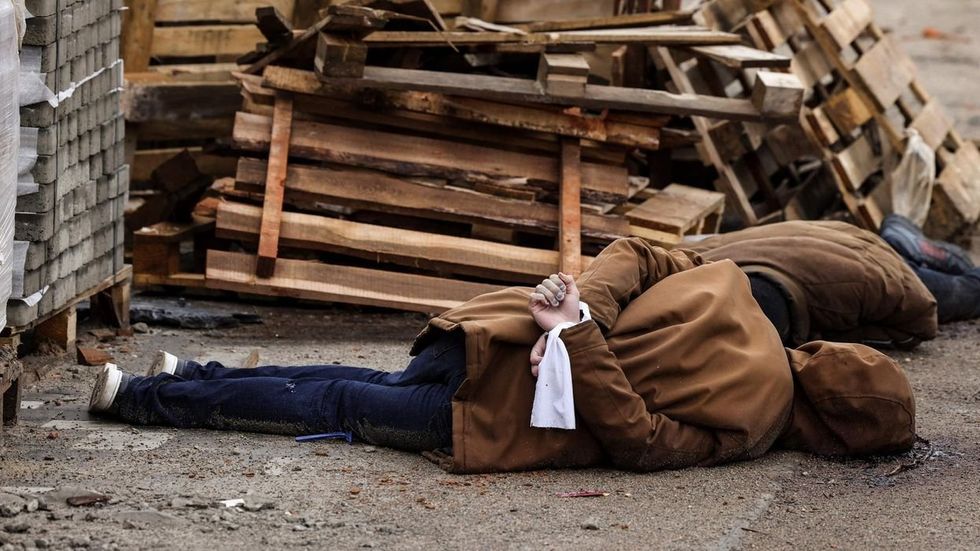 Is Putin's war in Ukraine genocide?https://www.gzeromedia.com/by-ian-bremmer/is-putin-s-war-in-ukraine-genocide
Is Putin's war in Ukraine genocide?https://www.gzeromedia.com/by-ian-bremmer/is-putin-s-war-in-ukraine-genocide
As Ukrainian forces retake Kyiv and Russian troops begin retreating to eastern and southern Ukraine, gruesome images surface from Bucha, a Kyiv suburb, revealing that civilians – women, children, and elderly – lay dead in the streets. Ukrainian officials and independent sources share horrific accounts of rape, torture, and execution by Russian soldiers, and hundreds of victims are found in mass graves. Russia denies responsibility and instead points fingers at Ukraine.
- Is Putin's war in Ukraine a genocide?
- The price of Russian defeat
- Zelensky wants justice over Russian war crimes
- Russian military on the ropes
June 2022: Russia withdraws from Snake Island
Russia retreats from Snake Island, with the Kremlin calling it a "gesture of goodwill" to disprove the hindrance of Ukrainian food exports, but Ukrainians credit their missile strikes. The blockade disrupted Ukraine's monthly grain exports of five million metric tons, spiking global food prices and sparking famine fears in Africa. Zmiinyi Island, 22 miles off Ukraine's coast, offers strategic advantages, but its capture hindered Kyiv's defense of the southwestern coast and Odesa port. While a Ukrainian victory, naval weakness hampers food export resumption, underscoring Kremlin's Donbas focus.
August 2022: Fighting around Zaporizhzhia power plant raises fears
Ukrainian Nuclear Power Plant in Peril | US Energy Secretary Granholm | GZERO Worldhttps://www.gzeromedia.com/gzero-world-clips/us-en...
Artillery duels erupt at Europe’s largest nuclear power station in Zaporizhzhia, southern Ukraine, now under Russian occupation. Both sides accuse the other of instigating the conflict. The IAEA raises concerns over the potential for a nuclear catastrophe, as shelling severely damages radiation sensors near a spent fuel storage unit. President Volodymyr Zelensky condemns the situation as “Russian nuclear terror.”
Sept. 11, 2022: Ukraine pushes back, reclaims over a thousand square miles
On the 200th day of the war, the Ukrainian military achieves its most significant gains against Russia since the invasion began. President Volodymyr Zelensky declares the liberation of over 1,000 kilometers of territory, pledging to "de-occupy" completely.
Sept. 21, 2022: Russia calls up reservists
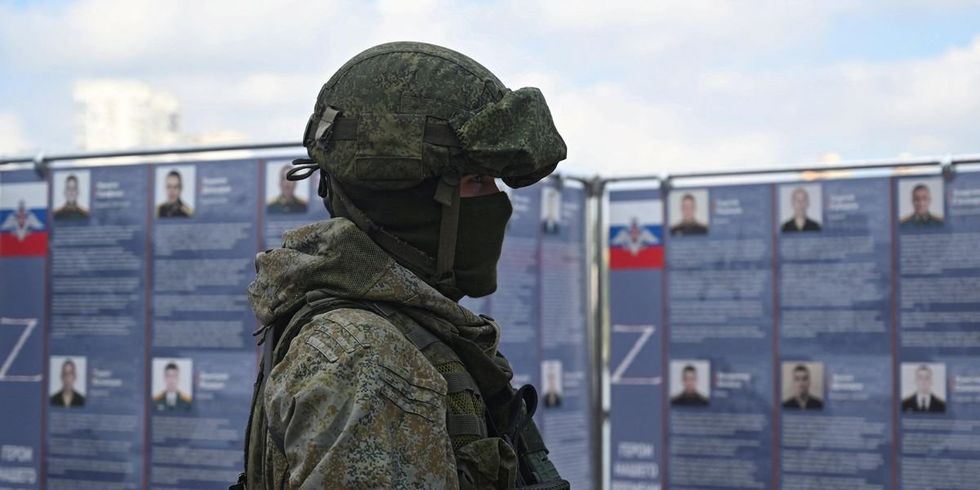 Russia calls up reservistshttps://www.gzeromedia.com/what-we-re-watching-iran-protests-spread-putin-mobilizes-ny-sues-trumps-china-faces-slow-growth
Russia calls up reservistshttps://www.gzeromedia.com/what-we-re-watching-iran-protests-spread-putin-mobilizes-ny-sues-trumps-china-faces-slow-growth
Vladimir Putin dramatically ups the ante and orders the partial mobilization of up to 300,000 reservists for the war in Ukraine. Ukrainian defiance persists, with Western leaders, including US President Joe Biden, reaffirming their commitment to pressure Putin's government and military. Meanwhile, Russia grapples with internal unrest, evident in protests and a surge of draft-age men fleeing the country. While Putin stops short of full mobilization, ongoing setbacks in the "special military operation" raise concerns about future escalations.
- The script for conscripts: Inside Putin’s (partial) mobilization
- QuickTake with Ian Bremmer: Putin cornered
- António Guterres: Ukraine war united NATO but further divided the world
Sept. 26, 2022: Who blew up Nord Stream?
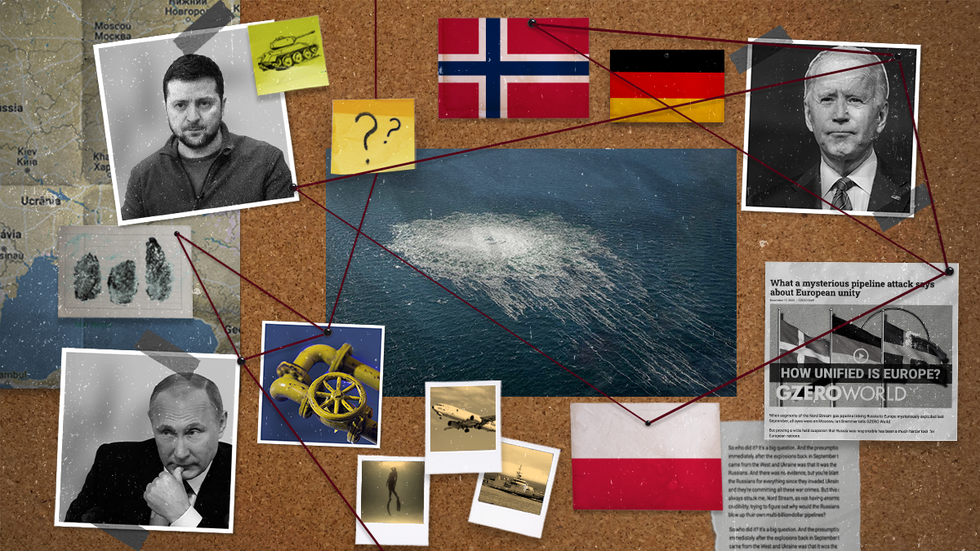 Who blew up Nord Stream?
Ian Bremmer
Who blew up Nord Stream?
Ian Bremmer
The controversial Nord Stream gas pipelines connecting Russia to Germany and Europe are sabotaged, leading to multiple investigations into whodunnit.
- Did someone blow up the Nord Stream pipelines?
- Another Baltic pipeline whodunnit
- Who blew up Nord Stream?
September 2022: Russia holds referenda in occupied parts of eastern Ukraine
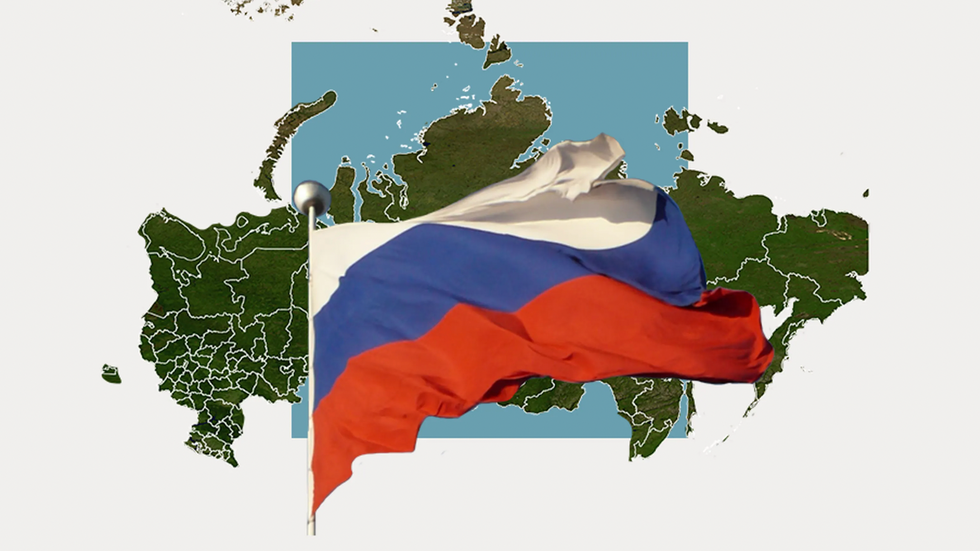 Russian annexationshttps://www.gzeromedia.com/what-we-re-watching-russian-annexations-the-india-pakistan-us-tango
Russian annexationshttps://www.gzeromedia.com/what-we-re-watching-russian-annexations-the-india-pakistan-us-tango
Putin’s sham referenda in four regions of Ukraine officially moves forward to annexations. Yet, with ongoing clashes, Luhansk, Donetsk, Zaporizhzhia, and Kherson remain battlegrounds. Securing control amid Ukrainian resistance could provide Putin with a strategic land bridge from southeastern Ukraine to Crimea, annexed in 2014. While Russia holds Luhansk and Kherson, and portions of Zaporizhzhia and Donetsk, Ukrainian forces persist in gaining ground. The referenda offer Putin a pretext, framing Ukrainian/Western attacks as assaults on Russia. Amid a faltering war, Putin terms it an "anti-colonial movement." In response, Ukrainian President Volodymyr Zelensky seeks accelerated NATO accession.
Oct. 8, 2022: Kerch Bridge blast
Russia launches a series of airstrikes targeting major Ukrainian cities: Kyiv, Kharkiv, Odesa, and even Lviv, previously deemed a haven. The attacks, hitting civilian areas during rush hour, inflict considerable damage to infrastructure, causing power outages and driving civilians into bomb shelters. While the death toll remains unconfirmed, casualties are expected to be substantial. This military escalation follows Saturday's explosion on the Crimea-Russia Kerch bridge, which Putin attributes to Ukrainian "terrorists." The strikes were ordered before Putin's National Security Council meeting, suggesting retaliation planning. Though the Kremlin has yet to comment officially, Putin ally Ramzan Kadyrov expresses satisfaction, advocating for reprisals against Ukrainian infrastructure.
- Putin lashes out after Crimea bridge blast
- Russian revenge vs. Ukrainian resolve
- Following Ukraine’s Crimea bridge attack, expect Putin to escalate "until he collapses"
January 2023: US and Germany offer tanks
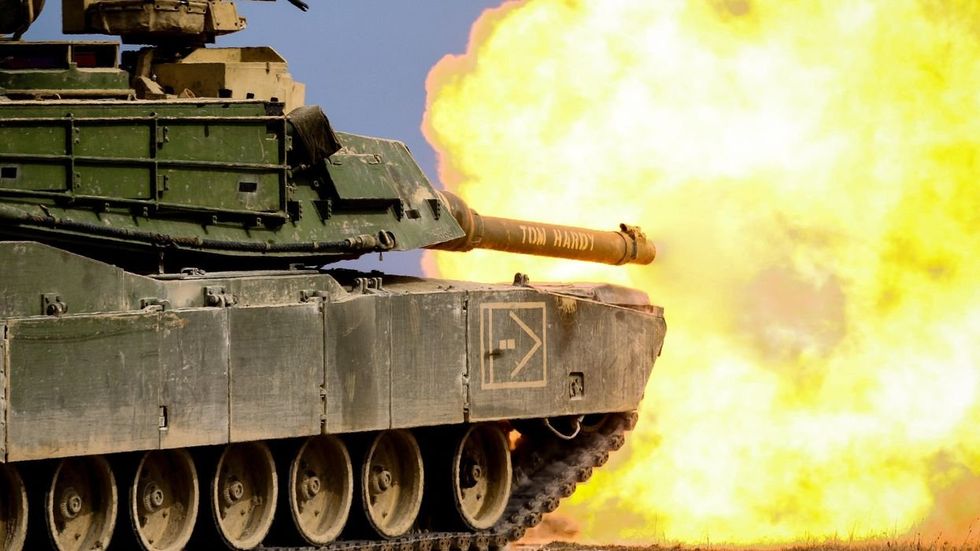 Ukraine tanks uphttps://www.gzeromedia.com/ukraine-tanks-up
Ukraine tanks uphttps://www.gzeromedia.com/ukraine-tanks-up
German Chancellor Olaf Scholz announces Germany's decision to send Leopard 2 battle tanks to Ukraine, following pressure from NATO countries led by Poland. Berlin initially resisted, concerned about antagonizing Russia and awaiting US action on supplying Abrams tanks. Two tank battalions, totaling roughly 80 Leopard 2 tanks, will be deployed to Ukraine, with training for Ukrainian soldiers commencing in Germany. However, US tank shipments may not arrive until spring, as the Ukrainian military lacks Abrams operation knowledge and maintenance supply lines and faces fuel consumption concerns.
- Ukraine tanks up
- Ukraine's killer dune buggies
- Zaporizhzhia nuclear plant at risk of disaster, says top nuclear watchdog
- Putin’s war crimes solidify West’s military support for Ukraine
- Russian unpredictability & Finland's border threat
February 2023: Biden visits Kyiv
Biden’s visit to Ukraine signals US commitment, but war gets tougher | Quick Take | GZERO Mediahttps://www.gzeromedia.com/quick-take/biden-visit-to-ukraine-signals-us-commitment-but-war-gets-tougher
President Biden makes a surprise trip to Kyiv, just before the first anniversary of Russia's invasion of Ukraine on Feb. 24. It's significant as the first visit by an American president since Russia's annexation of Crimea in 2014 and intervention in Southeast Ukraine. This underscores continued US commitment symbolically, boosts Ukrainian morale, and reassures NATO of America's unwavering prioritization of Ukraine, despite substantial aid and a year of conflict. The trip holds immense importance for diplomatic relations, emphasizing the enduring support for Ukraine amidst ongoing tensions with Russia.
June 8, 2023: Ukraine launches counteroffensive
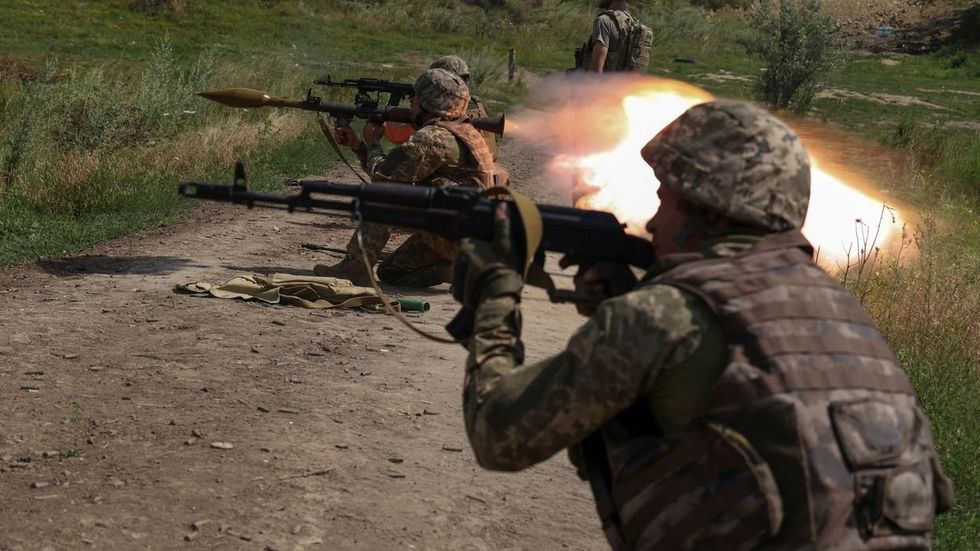 Ukraine ups the antehttps://www.gzeromedia.com/ukraine-ups-the-ante
Ukraine ups the antehttps://www.gzeromedia.com/ukraine-ups-the-ante
The New York Times reports that Ukraine's nearly two-month-old counteroffensive is ramping up in the southeast, per two anonymous Pentagon officials. Thousands of previously held-back reserves are now deploying to the front lines. Both Ukrainian and Russian reports corroborate this escalation. Whether Ukraine gains strategic ground or not marks a pivotal juncture in the war.
June 24, 2023: Prigozhin stages mutiny
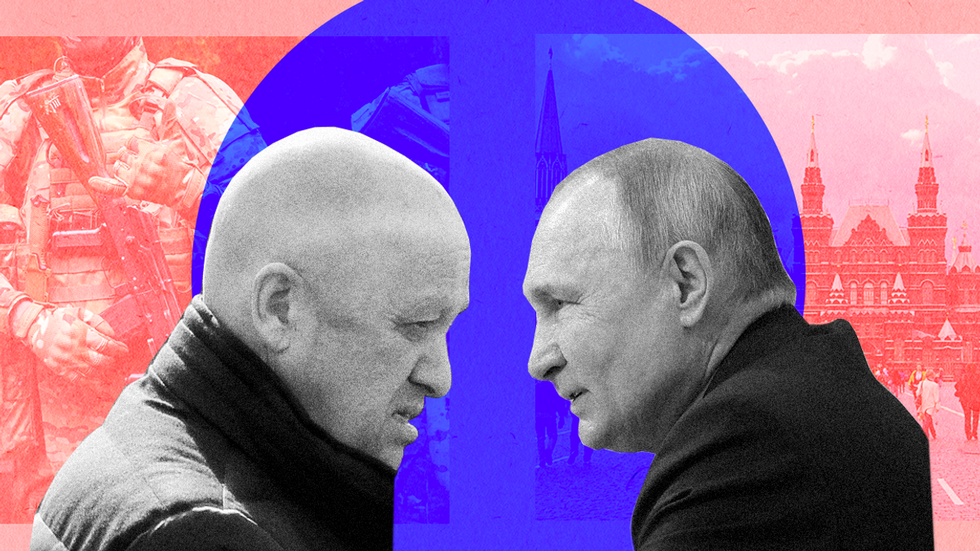 Russia’s aborted coup, explainedhttps://www.gzeromedia.com/by-ian-bremmer/russias-aborted-coup-explained
Russia’s aborted coup, explainedhttps://www.gzeromedia.com/by-ian-bremmer/russias-aborted-coup-explained
Wagner chief Yevgeny Prigozhin stages a failed mutiny against Vladimir Putin. Ian Bremmer predicts the move will be the beginning of the end of Prigozhin. According to Bremmer, Prigozhin, in the lead-up to his mutiny, had become increasingly erratic, indicative of his declining political influence. What's more, he directed fury at Russia’s Ministry of Defense, accusing them of sending thousands of soldiers to their deaths due to corruption, incompetence, and cowardice.
- Russia’s aborted coup, explained
- Former Russian intelligence officer: Prigozhin's threat to Putin is “ludicrous”
July 2023: Russia’s exit from the Black Sea Grain Deal
Russia's exit from Black Sea grain deal will drive up food prices | Europe In: 60https://www.gzeromedia.com/in-60-seconds/europe/russias-exit-from-black-sea-grain-deal-will-drive-up-food-prices
Russia announces its exit from the Black Sea grain deal, a move GZERO's Europe In :60 host and former Sweden PM Carl Bildt predicts would have severe consequences on global food prices. Continuous attacks on grain terminals near the Ukrainian-Romanian border aggravate the situation. Meanwhile, the progress of the Ukrainian counteroffensive slows down due to extensive Russian fortifications and mines. The Ukrainian army, largely composed of mobilized individuals with limited training, faces significant challenges.
Aug. 23, 2023: Prigozhin dies in plane crash
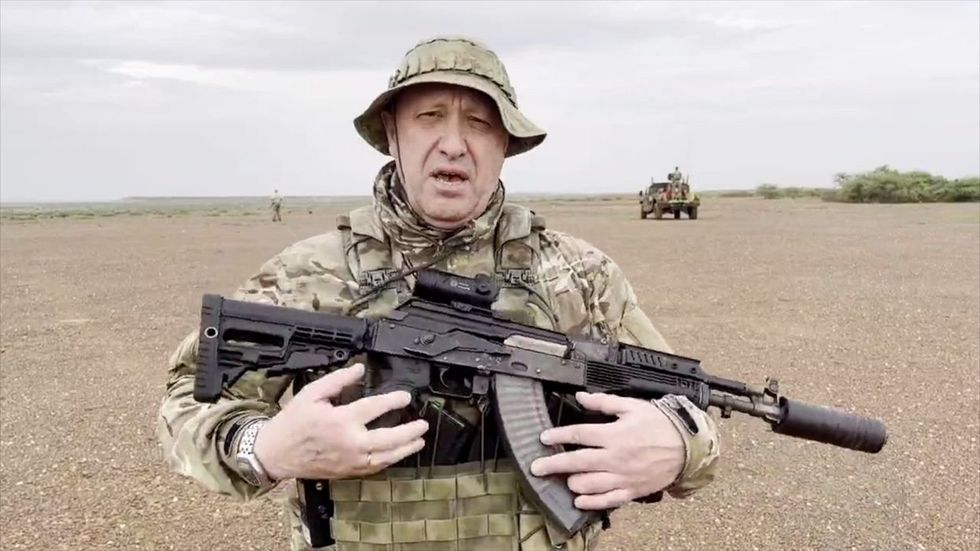 Wagner's Prigozhin dieshttps://www.gzeromedia.com/wagners-prigozhin-presu...
Wagner's Prigozhin dieshttps://www.gzeromedia.com/wagners-prigozhin-presu...
Russian state media reports a private aircraft crash outside Moscow, killing all 10 aboard, including Yevgeny Prigozhin, the Wagner Group warlord behind a failed mutiny against the Kremlin in June.
September 2023: Peace in Ukraine is world's priority, says UN chief António Guterres
November 2023: US govt avoids shutdown, cuts Ukraine funding
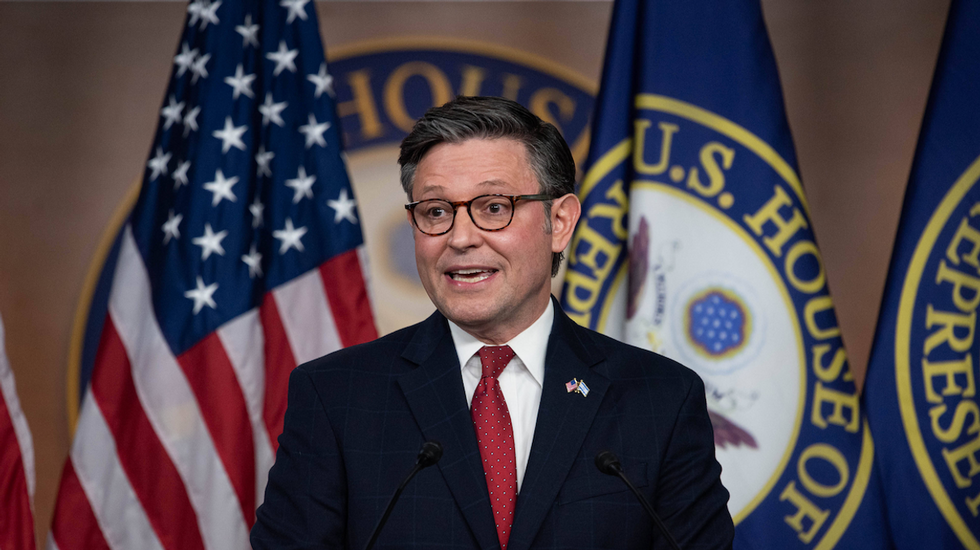 Shutdown averted, but deal contains no aid for Ukrainehttps://www.gzeromedia.com/gzero-north/shutdown-averted-but-deal-contains-no-aid-for-ukraine
Shutdown averted, but deal contains no aid for Ukrainehttps://www.gzeromedia.com/gzero-north/shutdown-averted-but-deal-contains-no-aid-for-ukraine
Ukraine's funding struggle continues as a divided US House finally reached an agreement to avoid a government shutdown but notably did not include military aid for either Ukraine or Israel. Democrats had tried to lump aid for Israel - which received bipartisan support - together with that of Ukraine, which faced resistance from Republicans. The decision is a significant blow to Ukraine, whose somewhat successful resistance against the Russian offensive relied heavily on US funding. What's more, their hopes of getting assistance from the EU face threats from Hungary's Prime Minister Viktor Orbán—an ally of Vladimir Putin.
February 2024: Russia recaptures Avdiivka
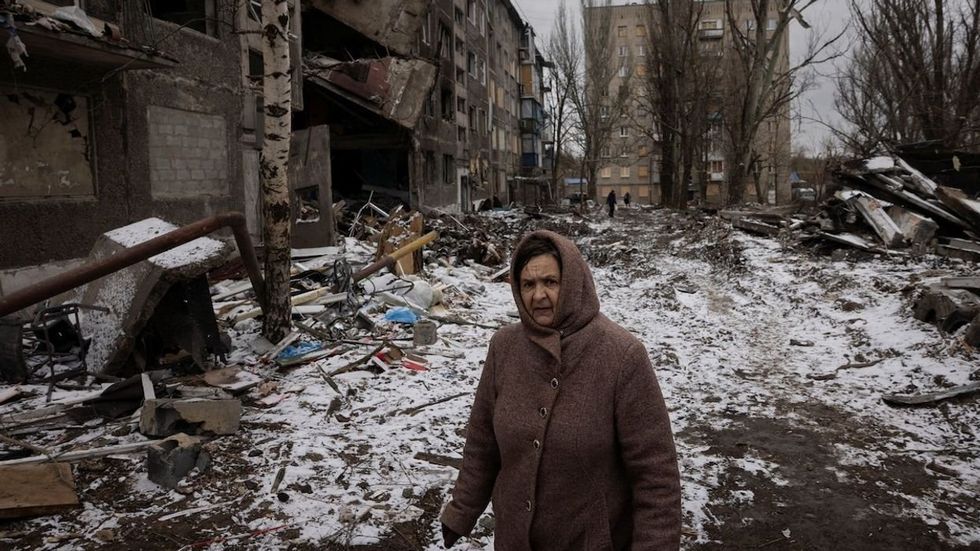 Pro-Russia blogger commits suicide, Russia recaptures Avdiivkahttps://www.gzeromedia.com/news/hard-numbers/hard-numbers-pro-russia-blogger-commits-suicide-uk-nuclear-missile-test-fails-biden-slashes-student-debt-iran-gives-russia-missiles
Pro-Russia blogger commits suicide, Russia recaptures Avdiivkahttps://www.gzeromedia.com/news/hard-numbers/hard-numbers-pro-russia-blogger-commits-suicide-uk-nuclear-missile-test-fails-biden-slashes-student-debt-iran-gives-russia-missiles
In mid-February 2024, Russian forces in Ukraine scored their first major victory in months, taking the strategic town of Avdiivka. A pro-Russian blogger who reported that 16,000 Russian troops had died in the effort faced a huge backlash and committed suicide.
- What Ukraine needs after two years of war with Russia - GZERO Media ›
- What's the plan for Ukraine after two years of war? Ian Bremmer explains - GZERO Media ›
- Ukraine is still standing two years after Russian invasion - GZERO Media ›
- Two years of war in Ukraine: Power players at the Munich Security Conference weigh in - GZERO Media ›
- Greece's PM on NATO, Navalny, and the wake-up call to Europe - GZERO Media ›
- A Russian victory would end the global order, says Yuval Noah Harari - GZERO Media ›
- Moscow terror attack: What happens next? - GZERO Media ›
- Ian Explains: Putin's Ukraine gamble - GZERO Media ›
- Putin trolls Europe about "the master" Trump - GZERO Media ›
- Trump-Putin chat over Ukraine "deeply" worries Europe - GZERO Media ›
- JD Vance stuns Munich conference with critique on European democracy - GZERO Media ›




